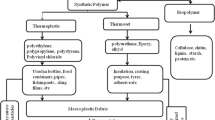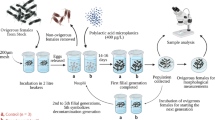Abstract
Plastic pollution has become a global environmental problem of major concern. However, the plastic contamination in the marine top predators, particularly in endangered species, is incompletely understood because of the limited amount of data on their presence in the digestive system and prey. This study investigated the stomach contents of an endangered but poorly known shark species, the longfin mako shark (Isurus paucus), found in the tropical western Pacific Ocean. We examined the plastics in this female specimen (1.22-m fork length) and her prey to assess the potential for trophic transfer of microplastics. Polypropylene bottle cap and lollipop packaging, longnose lancetfish (Alepisaurus ferox), and squid were found in the stomach of I. paucus, while no apparent internal injuries were noted. The microplastic fragments and granules, confirmed by laser direct infrared spectroscopy, were found in the digestive system of the intact squid ingested by I. paucus, suggesting that trophic transfer may occur between shark and prey. These results indicate that I. paucus is vulnerable to plastic ingestion and provide evidence of trophic transfer of microplastics in shark species. Our study emphasizes the need to evaluate the potential ecotoxicological consequences of increasing plastic pollution to endangered marine top predators.

Similar content being viewed by others
Data availability
The datasets generated and/or analyzed during the current study are available from the corresponding author on reasonable request.
References
Amon DJ, Kennedy BRC, Cantwell K, Suhre K, Glickson D, Shank TM, Rotjan RD (2020) Deep-sea debris in the Central and Western Pacific Ocean. Front Mar Sci 7:1–15. https://doi.org/10.3389/fmars.2020.00369
Andrady AL (2015) Persistence of plastic litter in the oceans. In: Bergmann M, Gutow L, Klages M, editors. Marine Anthropogenic Litter. Springer Open: Springer Nature Switzerland, p 57–72
Avio CG, Gorbi S, Milan M, Benedetti M, Fattorini D, D’Errico G, Pauletto M, Bargelloni L, Regoli F (2015) Pollutants bioavailability and toxicological risk from microplastics to marine mussels. Environ Pollut 198:211–222. https://doi.org/10.1016/j.envpol.2014.12.021
Barreto R, Bornatowski H, Fiedler FN, Pontaltic M, da Costa KJ, Nascimentod C, Kotas JE (2019) Macro-debris ingestion and entanglement by blue sharks (Prionace glauca Linnaeus, 1758) in the temperate South Atlantic Ocean. Mar Pollut Bull 145:214–218. https://doi.org/10.1016/j.marpolbul.2019.05.025
Benjamin D, Rozario JV, Deepak J, Prabhakaran MP, Madhusoodana Kurup B, Harikrishnan M (2014) Plastic ingestion by bigeye thresher shark Alopias superciliosus off Ratnagiri southwest coast of India. Int J Environ Sci 5(2):277–281. https://doi.org/10.6088/ijes.2014050100024
Bernardini I, Garibaldi F, Canesi L, Fossi MC, Baini M (2018) First data on plastic ingestion by blue sharks (Prionace glauca) from the Ligurian Sea (North-Western Mediterranean Sea). Mar Pollut Bull 135:303–310. https://doi.org/10.1016/j.marpolbul.2018.07.022
Bowman RE, Stillwell CE, Michaels WL, Grosslein MD (2000) Food of northwest Atlantic fishes and two common species of squid. Tech Rep NMFS-NE-155:138. National Marine Fisheries Service, Mashpee, MA
Bustamante C, Concha F, Balbontín F, Lamilla J (2009) Southernmost record of Isurus paucus Gitart Manday, 1966 (Elasmobranchii: Lamnidae) in the southeast Pacific Ocean. Rev Biol Mar Oceanogr 44. https://doi.org/10.4067/s0718-19572009000200025
Castro JI, Woodley CM, Brudek RL (1999) A preliminary evaluation of the status of shark species. Fisheries Technical Paper 380:1–172. Food and Agriculture Organisation, Rome
Chagnon C, Thiel M, Antunes J, Ferreira JL, Sobral P, Ory NC (2018) Plastic ingestion and trophic transfer between Easter Island flying fish (Cheilopogon rapanouiensis) and yellowfin tuna (Thunnus albacares) from Rapa Nui (Easter Island). Environ Pollut 243:127–133. https://doi.org/10.1016/j.envpol.2018.08.042
Choy CA, Drazen JC (2013) Plastic for dinner? Observations of frequent debris ingestion by pelagic predatory fishes from the Central North Pacific. Mar Ecol Prog Ser 485:155–163. https://doi.org/10.3354/meps10342
Compagno LJV (2001) Sharks of the world. An annotated and illustrated catalogue of shark species known to date. Vol. 2. Bullhead, mackerel and carpet sharks (Heterodontiformes, Lamniformes and Orectolobiformes). Report No 1, vol 2. Food and Agriculture Organisation of United Nations, Rome
De Stephanis R, Giménez J, Carpinelli E, Gutierrez-Exposito C, Cañadas A (2013) As main meal for sperm whales: plastics debris. Mar Pollut Bull 69:206–214. https://doi.org/10.1016/j.marpolbul.2013.01.033
Duhec AV, Jeanne RF, Maximenko N, Hafner J (2015) Composition and potential origin of marine debris stranded in the western Indian Ocean on remote Alphonse Island, Seychelles. Mar Pollut Bull 96:76–86. https://doi.org/10.1016/j.marpolbul.2015.05.042
Farrell P, Nelson K (2013) Trophic level transfer of microplastic: Mytilus edulis (L.) to Carcinus maenas (L.). Environ Pollut 177:1–3. https://doi.org/10.1016/j.envpol.2013.01.046
Ferretti F, Worm B, Britten GL, Heithaus MR, Lotze HK (2010) Patterns and ecosystem consequences of shark declines in the ocean. Ecol Lett 13:1055–1071. https://doi.org/10.1111/j.1461-0248.2010.01489.x
Gong Y, Wang Y, Chen L, Li Y, Chen X, Liu B (2021) Microplastics in different tissues of a pelagic squid (Dosidicus gigas) in the northern Humboldt current ecosystem. Mar Pollut Bull 169:112509. https://doi.org/10.1016/j.marpolbul.2021.112509
Hermabessiere L, Dehaut A, Paul-Pont I, Lacroix C, Jezequel R, Soudant P, Duflos G (2017) Occurrence and effects of plastic additives on marine environments and organisms: a review. Chemosphere 182:781–793. https://doi.org/10.1016/j.chemosphere.2017.05.096
Hermsen E, Mintenig SM, Besseling E, Koelmans AA (2018) Quality criteria for the analysis of microplastic in biota samples: a critical review. Environ Sci Technol 52:10230–10240. https://doi.org/10.1021/acs.est.8b01611
Huang X, Gao H, Li Z, Wu F, Gong Y, Li Y (2022) Microplastic contamination and risk assessment in blue shark (Prionace glauca) from the eastern tropical Pacific Ocean. Mar Pollut Bull 184:114138. https://doi.org/10.1016/j.marpolbul.2022.114138
Hueter RE, Tyminski JP, Morris JJ, Abierno AR, Valdes JA (2016) Horizontal and vertical movements of longfin makos (Isurus paucus) tracked with satellite linked tags in the northwestern Atlantic Ocean. Fish Bull 115:101–116. https://doi.org/10.7755/FB.115.1.9
Hwang J, Choi D, Han S, Choi J, Hong J (2019) An assessment of the toxicity of polypropylene microplastics in human derived cells. Sci Total Environ 684:657–659. https://doi.org/10.1016/j.scitotenv.2019.05.071
Im J, Joo S, Lee Y, Kim BY, Kim T (2020) First record of plastic debris ingestion by a fin whale (Balaenoptera physalus) in the sea off East Asia. Mar Pollut Bull 159:111514. https://doi.org/10.1016/j.marpolbul.2020.111514
Jambeck JR, Geyer R, Wilcox C, Siegler TR, Perryman M, Andrady A, Narayan R, Law KL (2015) Plastic waste inputs from land into the ocean. Science 347(6223):768–771. https://doi.org/10.1126/science.1260352
Jantz LA, Morishige CL, Bruland GL, Lepczyk CA (2013) Ingestion of plastic marine debris by longnose lancetfish (Alepisaurus ferox) in the North Pacific Ocean. Mar Pollut Bull 69:97–104. https://doi.org/10.1016/j.marpolbul.2013.01.019
Kubodera T, Watanabe H, Ichii T (2007) Feeding habits of the blue shark, Prionace glauca, and salmon shark, Lamna ditropis, in the transition region of the western North Pacific. Rev Fish Biol Fish 17:111–124. https://doi.org/10.1007/s11160-006-9020-z
Lithner D, Larsson A, Dave G (2011) Environmental and health hazard ranking and assessment of plastic polymers based on chemical composition. Sci Total Environ 409:3309–3324. https://doi.org/10.1016/j.scitotenv.2011.04.038
Liu N, Cheng S, Wang X, Li Z, Zheng L, Lyu Y, Ao X, Wu H (2022) Characterization of microplastics in the septic tank via laser direct infrared spectroscopy. Water Res 226:119293. https://doi.org/10.1016/j.watres.2022.119293
Maes T, van Diemen de Jel J, Vethaak AD, Desender M, Bendall VA, van Velzen M, Leslie HA (2020) You are what you eat, microplastics in porbeagle sharks from the North East Atlantic: method development and analysis in spiral valve content and tissue. Front Mar Sci 7(1):17. https://doi.org/10.3389/fmars.2020.00273
Maia A, Queiroz N, Correia JP, Cabral H (2006) Food habits of the shortfin mako, Isurus oxyrinchus, off the southwest coast of Portugal. Environ Biol Fishes 77:157–167. https://doi.org/10.1007/s10641-006-9067-7
Matsumoto R, Toda M, Matsumoto Y, Ueda K, Nakazato M, Sato K, Uchida S (2017) Notes on husbandry of whale sharks, Rhincodon typus, in aquaria. In: Smith M, Warmolts D, Thoney D, Hueter R, editors. Elasmobranch Husb. Man. II recent Adv. Care sharks, rays their Relat. Special publication of the Ohio biological survey, p 15–22
Myers RA, Baum JK, Shepherd TD, Powers SP, Peterson CH (2007) Cascading effects of the loss of apex predatory sharks from a coastal ocean. Science 315:1846–1850. https://doi.org/10.1126/science.1138657
Nelms SE, Galloway TS, Godley BJ, Jarvis DS, Lindeque PK (2018) Investigating microplastic trophic transfer in marine top predators. Environ Pollut 238:999–1007. https://doi.org/10.1016/j.envpol.2018.02.016
Ory NC, Sobral P, Ferreira JL, Thiel M (2017) Amberstripe scad Decapterus muroadsi (Carangidae) fish ingest blue microplastics resembling their copepod prey along the coast of Rapa Nui (Easter Island) in the South Pacific subtropical gyre. Sci Total Environ 586:430–437. https://doi.org/10.1016/j.scitotenv.2017.01.175
Rigby CL, Barreto R, Carlson J, Fernando D, Fordham S, Francis MP, Jabado RW, Liu KM, Marshall A, Pacoureau N, Romanov E, Sherley RB, Winker H (2019) Isurus paucus. IUCN Red List Threat Species 2019 8235, e.T60225A3095898. Available: https://doi.org/10.2305/IUCN.UK.2019-1.RLTS.T60225A3095898.en. (April 2021)
Ruiz-Abierno A, Márquez-Fariás JF, Trápaga-Roig M, Hueter RE (2021) Length at maturity of two pelagic sharks (Isurus paucus and Carcharhinus longimanus) found off northern Cuba. Bull Mar Sci 97:77–88. https://doi.org/10.5343/BMS.2020.0033
Sampaio CL, Leite L, Reis-Filho JA, Loiola M, Miranda RJ, de Anchieta CC, Nunes J, Macena BC (2018) New insights into whale shark Rhincodon typus diet in Brazil: an observation of ram filter-feeding on crab larvae and analysis of stomach contents from the first stranding in Bahia state. Environ Biol Fishes 101:1285–1293. https://doi.org/10.1007/s10641-018-0775-6
Savoca MS, Tyson CW, McGill M, Slager CJ (2017) Odours from marine plastic debris induce food search behaviours in a forage fish. Proc Royal Soc B 284:20171000
Setälä O, Fleming-lehtinen V, Lehtiniemi M (2014) Ingestion and transfer of microplastics in the planktonic food web. Environ Pollut 185:77–83. https://doi.org/10.1016/j.envpol.2013.10.013
Suaria G, Avio CG, Mineo A, Lattin GL, Magaldi MG, Belmonte G, Moore CJ, Regoli F, Aliani S (2016) The Mediterranean plastic soup: synthetic polymers in Mediterranean surface waters. Sci Rep 6:37551. https://doi.org/10.1038/srep37551
Varghese SP, Unnikrishnan N, Gulati DK, Ayoob AE (2017) Size, sex and reproductive biology of seven pelagic sharks in the eastern Arabian Sea. J Mar Biol Assoc United Kingdom 97:81–196. https://doi.org/10.1017/S0025315416000217
Wright SL, Thompson RC, Galloway TS (2013) The physical impacts of microplastics on marine organisms: a review. Environ Pollut 178:483–492. https://doi.org/10.1016/j.envpol.2013.02.031
Acknowledgements
The authors are grateful to the captain and the crews of the scientific vessel “SONGHANG” of Shanghai Ocean University. The authors thank all the staff at Shanghai Ocean University for their assistance with sample pretreatment.
Funding
This work was supported by the National Natural Science Foundation of China (31900333, 42276092) and the program on the Survey, Monitoring and Assessment of Global Fishery Resources (comprehensive scientific survey of fisheries resources at the high seas) sponsored by the Ministry of Agriculture and Rural Affairs of China.
Author information
Authors and Affiliations
Contributions
Yi Gong, conceptualization, methodology, software, formal analysis, writing — original draft, and funding acquisition. Xuemin Huang, conceptualization, methodology, software, formal analysis, and writing — original draft. Zezheng Li, methodology, validation, formal analysis, and investigation. Yongfu Shen, methodology and investigation. Yunkai Li, resources, supervision, and funding acquisition. Jiangfeng Zhu, resources, supervision, and funding acquisition. Feng Wu, methodology.
Corresponding author
Ethics declarations
Ethics approval
It has not been submitted for publication, nor has been published in whole or in part elsewhere.
Consent to participate
Informed consent was obtained from all individual participants included in the study.
Consent for publication
All participants have consented to the submission of this article to the journal and publication of it.
Conflict of interest
The authors declare no competing interests.
Additional information
Responsible Editor: Philippe Garrigues
Publisher's note
Springer Nature remains neutral with regard to jurisdictional claims in published maps and institutional affiliations.
Rights and permissions
Springer Nature or its licensor (e.g. a society or other partner) holds exclusive rights to this article under a publishing agreement with the author(s) or other rightsholder(s); author self-archiving of the accepted manuscript version of this article is solely governed by the terms of such publishing agreement and applicable law.
About this article
Cite this article
Gong, Y., Huang, X., Li, Z. et al. Plastic ingestion and trophic transfer in an endangered top predator, the longfin mako shark (Isurus paucus), from the tropical western Pacific Ocean. Environ Sci Pollut Res 30, 107365–107370 (2023). https://doi.org/10.1007/s11356-023-25532-5
Received:
Accepted:
Published:
Issue Date:
DOI: https://doi.org/10.1007/s11356-023-25532-5




